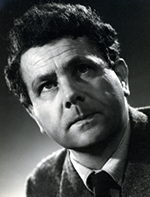FINZI AND RESPIGHI
Notes on the composers and the pieces
Gerald Finzi
Intimations of Immortality
Ottorino Respighi
Pini di Roma (Pines of Rome)
Return to Home Page |

Gerald Finzi: Intimations of Immortality, Op. 29, an ode for tenor, chorus, and orchestra
English music is imbued with the English countryside and the ocean with its rocky coastline and cliff-sides. It is full of English history, literature, and folklore. Its color is that of soft pastels of a misty day on a moor. Some of it is walking and marching music, not with arrogance, but with a confidence bordering on serenity. No country’s composers talk about “tunes” as much as England’s do. English melody is vocal and distinctive and often modal; perhaps that comes from the English choral tradition. The English have always sung, and they didn't stop when they wrote for orchestra.
English composer Gerald Finzi was born in London in July 1901. His father and three brothers died when he was quite young. In 1914 his family settled in Harrogate, and in 1915 he began to study music composition with English composer and organist Ernest Farrar, a pupil of noted English composer Charles Villiers Stanford. Finzi found Farrar to be a fine teacher, but the lessons came to an end when Farrar was called up to serve in the Great War. Like many composers of the time who were forced to walk the path to war, Farrar was killed in battle, a loss that his former pupil found devastating. Fortunately, young Finzi was able to move on and study with another English organist and composer, Edward Bairstow.
In 1922 Finzi moved to Gloucestershire in southwest England. After studying counterpoint with Reginald Owen Morris (better known as R.O. Morris), he moved back to London where he met several major English composers including Gustav Holst and Ralph Vaughan Williams who helped him obtain a teaching post at the Royal Academy of Music in 1930. In 1933 he moved to Aldbourne, a village in southwest England. He moved again in 1939, this time to nearby Ashmansworth where he founded the Newbury String Players and championed the music of neglected 18th century English composers as well as Gloucester-born composer and poet Ivor Gurney. During World War II he served at the Ministry of War Transport until 1945.
Gerald Finzi was a man of several interests. A literary man as well as a composer, he admired the works of Thomas Hardy and William Wordsworth enough to set some of their texts in his vocal pieces. He not only read books, he collected them, and many of his 3,000 volumes are now in the libraries of the University of Reading and the University of St. Andrews. His music research led to the publication of pieces by several English composers from the 18th and 20th Centuries. He also developed an apple orchard where he grew over 300 varieties of apples.
Given the tragedies of Finzi’s youth, it is no surprise that many of his works are sad in tone with some dealing with childhood innocence corrupted by adult experience. For solace he often turned to the poetry of William Wordsworth, Thomas Traherne, Thomas Hardy, and Christina Rossetti. He also began to set poetry to music. The two came together in Intimations of Immortality. a setting of nine stanzas of William Wordsworth’s eleven-stanza poem Ode: Intimations of Immortality from Recollections of Early Childhood. (Finzi did not set stanzas seven and eight.) The work is scored for tenor soloist, chorus, and orchestra and fits comfortably in the English chorus and orchestra tradition. He started its composition in the late 1930s, but his service in World War II delayed completion until 1950—a gap that partly explains why the music of Intimations fits so nicely between the music of English composers like Vaughan Williams, Edward Elgar, Herbert Howells, Charles Hubert Parry, Charles Villiers Stanford, and others. and the more modern ones like William Walton and Benjamin Britten. Works with a chorus are often based on written text that is not well understood in performance, but Wordsworth’s text is reasonably discernable, thanks to the clarity of Finzi’s writing. That is a major asset because there is an interesting philosophical quality to Wordsworth’s poem.
Finzi was originally going to dedicate Intimations to Ralph Vaughan Williams, but instead he dedicated it to Vaughan Williams’ first wife, Adeline. The piece was premiered at the Three Choirs Festival in Gloucester in 1950 with Herbert Sumsion conducting. Gerald Finzi died on September 27, 1956, at the age of 55. As if to intuitively bid him farewell, his new Cello Concerto was first broadcast on BBC radio the night before his death.
—Roger Hecht
Roger Hecht plays trombone in the Mercury Orchestra. He is a former member of Bay Colony Brass (where he was also the Operations/Personnel Manager), the Syracuse Symphony, Lake George Opera, New Bedford Symphony, and Cape Ann Symphony, as well as trombonist and orchestra manager of Lowell House Opera, Commonwealth Opera, and MetroWest Opera. He is a regular reviewer for American Record Guide, contributed to Classical Music: Listener’s Companion, and has written articles on music for the Elgar Society Journal and Positive Feedback magazine. His fiction collection, The Audition and Other Stories, includes a novella about a trombonist preparing for and taking a major orchestra audition (English Hill Press, 2013).
Read about Respighi
Return to Home Page
|
